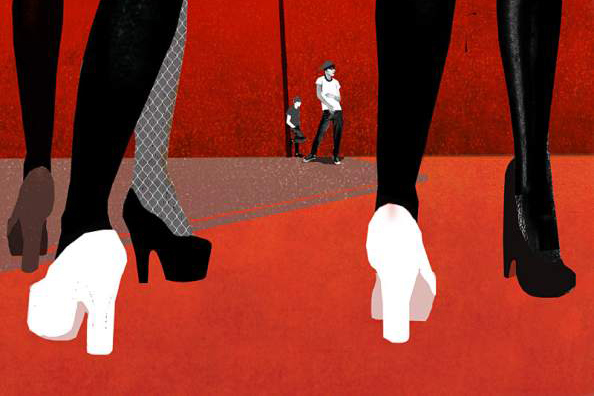The title of a powerful feature published in The New York Times Magazine on Sunday posed the question: “Should Prostitution Be a Crime?”
Reporter Emily Bazelon spoke with dozens of sex workers around the world, including several from Seattle, to draw a nuanced portrait of the underground sex economy. For some, selling sex is a fun, easy way to earn several times what they’d be paid for legal work. For others, it’s a traumatic necessity dictated by appalling circumstances. And for most, at least in Bazelon’s account, the experience falls somewhere between those two extremes.
Bazelon concludes: “The sex-workers’ rights movement is a rebellion against punishment and shame. It demands respect for a group that has rarely received it, insisting that you can only really help people if you respect them.”
Many of Bazelon’s subjects (much like Amnesty International and the Human Rights Watch) want to decriminalize sex work. She describes the health benefits of removing criminal sanctions from in New Zealand and part of Australia, achieved without any discernible increase in the overall sex trade. She lists the harms that well-intentioned crusaders have wrought upon their rescue targets. She details the unholy alliance between the Christian right and what one critic calls “carceral feminists” to turn the abolition of sold sex into a moral crusade. She describes an influential abolitionist casually dismissing sex workers’ very capacity for consent. And she raises questions about the shape of the sex market—the extent to which violence and coercion influence people’s choices about whether to do sex work.
The piece raises important questions as to what kind of policy will maximize the agency of, and minimize the harm to, people engaged in the sex trade—questions that at this point we aren’t prepared to definitively answer. But there’s one piece of low-hanging policy fruit we’d like to modestly propose: Remove criminal sanctions against sex workers.
Should we still arrest johns and pimps? Maybe—although Bazelon’s article and our own interviews with Seattle sex workers make us skeptical. But there is no excuse, no coherent rationale, for arresting and potentially jailing and/or fining the people who are providing the actual sex.
To their credit, the Seattle City Attorney’s and King County Prosecutor’s offices have already started down this road. For the past four years or so, they’ve shifted strategy from targeting sex workers to working to “End Demand” by targeting buyers. (Sex-worker advocates argue that this still puts them at risk, because it makes johns want to meet in isolated locations.) Deputy prosecutor Val Richey, who coordinates the county’s “Buyer Beware” program, told us last year that he was “confused and upset” when he learned, circa 2012, that people selling sex were arrested and prosecuted at much, much higher rates that people buying. “It was not consistent with our values to continue to prosecute those cases in that way,” he says. “Or period, frankly.”
But this pivot toward buyers hasn’t stopped local law enforcers from posing as johns to bust sex workers on Aurora Avenue, then using the threat of prosecution to push those workers into accepting services. “I know these girls like the back of my hand,” one Seattle vice detective told Crosscut last year. “I can assure you . . . they need to be pulled along by the judicial system. They’ve got to be put before a judge and told, ‘Jail or services.’ ”
“The vast, vast majority of [sex workers the prosecutor’s office deals with] are controlled by a pimp,” says Richey. “The people who are selling sex are often being exploited. Not always, but often.”
If, as Richey and others believe, the problem with prostitution is that it’s overwhelmingly coercive, then coercing people to cease prostitution is akin to destroying a village in order to save it.
There’s also a more pragmatic problem: trust. As local sex workers we’ve interviewed have told us, if they can’t trust law enforcers not to arrest them for sex work, then they’ll hesitate to call the police for more serious crimes like assault, blackmail, or human trafficking.
Police should be a resource, rather than a threat, to our city’s most vulnerable. Consequently, arrest and the threat of jail or a serious fine is not an appropriate fate for people who sell sex. Even—indeed, especially—in the most appalling cases. ■
editorial@seattleweekly.com








